Les Misérables 4K Blu-ray Movie
HomeLes Misérables 4K Blu-ray Movie 
4K Ultra HD + Blu-ray + Digital CopyUniversal Studios | 2012 | 158 min | Rated PG-13 | Jul 18, 2023
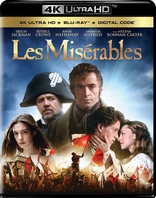
Movie rating
7.3 | / 10 |
Blu-ray rating
| Users | 4.0 | |
| Reviewer | 3.5 | |
| Overall | 3.6 |
Overview
Les Misérables 4K (2012)
An adaptation of the successful stage musical based on Victor Hugo's classic novel set in 19th-century France, in which a paroled prisoner named Jean Valjean seeks redemption.
Starring: Hugh Jackman, Anne Hathaway, Amanda Seyfried, Russell Crowe, Sacha Baron CohenDirector: Tom Hooper
| Romance | Uncertain |
| Musical | Uncertain |
| Period | Uncertain |
| Melodrama | Uncertain |
| Drama | Uncertain |
Specifications
Video
Video codec: HEVC / H.265
Video resolution: 4K (2160p)
Aspect ratio: 1.85:1
Original aspect ratio: 1.85:1
Audio
English: Dolby Atmos
English: Dolby TrueHD 7.1 (48kHz, 24-bit)
English: Dolby Digital 5.1 (640 kbps)
English: Dolby Digital 2.0 (192 kbps)
Subtitles
English SDH, French, Japanese, Spanish, Czech, Danish, Finnish, Korean, Mandarin (Traditional), Norwegian, Swedish
Discs
Blu-ray Disc
Two-disc set (2 BDs)
Digital copy
4K Ultra HD
Packaging
Slipcover in original pressing
Playback
Region free
Review
Rating summary
| Movie | 3.5 | |
| Video | 4.5 | |
| Audio | 5.0 | |
| Extras | 2.5 | |
| Overall | 3.5 |
Les Misérables 4K Blu-ray Movie Review
Reviewed by Jeffrey Kauffman July 21, 2023Kind of incredibly, it's been over ten years since Universal first released Les Misérables on (1080) Blu-ray, and while perhaps not
quite
as relentless as Javert's pursuit of Jean Valjean, the studio is back again now chasing after prospective consumers with a 4K UHD release. For
convenience sake, I'm repeating
relevant portions of my original 1080 review below, though of course the technical analyses are new to this version.
Hi. My name is Jeff and I love musicals. There, I’ve said it and there’s no turning back, and if it means I'm a
charter member of Musical Lovers Anonymous, so be it. I’ve joked for years that
my father, who was a Major General in the United States Army, got a little concerned when my interests strayed from
West Point to West Side Story when I was still a child, but I actually ended up a happily married man with kids
(let’s face it, my Dad’s concern had nothing to do with musicals per se). I just happen to love musicals.
This is evidently a love which skips a generation, for when I attempted to sit my own sons down to watch Oliver!
one day, they both ran screaming from the room as if I had asked them to willingly submit to torture (which in their
minds, it may well have been). I’ve been lucky to have conducted many musicals in my career as a musician, and
there’s no denying the rush that comes from a well knit combination of story and song, especially with great actors and
singers (and instrument players) helping to, in the words of Stephen Sondheim, put it all together. Even those who
love this particular genre have had to admit that film musicals have
had a rather rocky road of it over the past several decades. The supposed “reboot” of the genre with Chicago in 2002 did not in fact usher in a
grand new Golden Era of singing and dancing, and the few musicals that have appeared since the Kander and
Ebb opus have met with decidedly mixed critical reactions. That trend seems to be continuing with the disparate
responses to Les Misérables, despite the film’s multiple Academy Award nominations (and eventual three wins,
including Anne Hathaway as Best Supporting Actress). Have we simply become too jaded en masse to be able
to suspend disbelief when a character suddenly lapses into song (and/or dance)? Or are there other issues which are
endemic to the form that prevent it from being more readily enjoyed by the public at large? Les Misérables has
been rather successful as far as film musicals go and some would argue it is one of the most thoughtful
adaptations of a stage musical to the medium of film. But does that necessarily mean it’s good, let alone great?
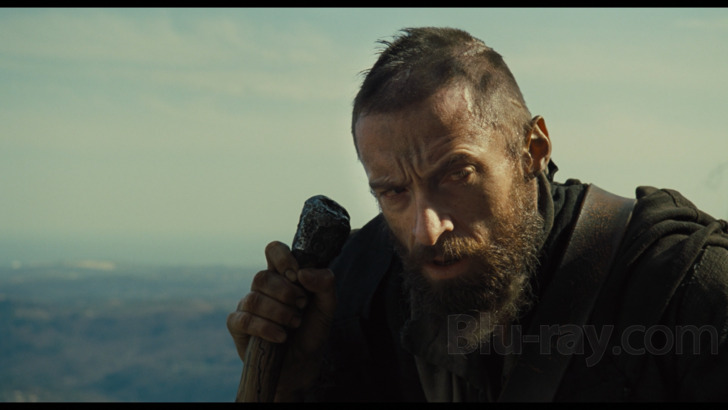
Aside from announcing my charter membership in Musical Lovers Anonymous, I also need to make a confession: I was wrong. When this feature film version of Les Misérables was announced on the Les Misérables in Concert: The 25th Anniversary Blu-ray in 2010, I warned fans not to hold their breaths for the trumpeted 2013 release. Knowing the gargantuan nature of this piece, I frankly doubted the ability of anyone to be able to marshal the forces necessary in time to meet that deadline. This only proves what dedicated creative crews are capable of (and in fact they beat that prediction by a year), for no matter what else you may say about the film of Les Misérables, it is in fact gargantuan in every sense of the word, teeming with thousands of extras, huge sets, and a hefty running time.
Are there many people who don’t know at least the outlines of Les Misérables sprawling plot? Jean Valjean (Hugh Jackman) has been imprisoned for close to two decades in post-Revolutionary France for the heinous crime of stealing a loaf of bread to help feed his family. As the film starts, he’s finally granted parole by the vicious Javert (Russell Crowe), though due to the laws of the time, he’s forced to “wear a scarlet letter” of sorts, carrying around papers that identify him as a danger to society at large. Valjean finally finds some respite from a kindly bishop (Colm Wilkinson, who originated the role of Valjean on stage), though Valjean’s darker tendencies initially seem to put him in danger of returning to prison. The Bishop’s mentoring saves Valjean from himself and the story segues forward several years where Valjean has broken his parole and adopted a new identity to become a respected business owner as well as Mayor of a French village.
One of Javert’s factory workers is a young woman named Fantine (Anne Hathaway) who is harboring a secret which gets her fired under Valjean’s nose. That in turn leads the hapless girl into a life of prostitution. In the meantime Javert has shown up in Valjean’s town and the obsessed official is convinced that the Mayor is in fact the long lost Valjean. These two competing storylines come to a head when Valjean rescues Fantine from her sordid existence and Javert reveals that a (completely innocent) man has been arrested as the long lost Valjean. Fantine dies, but not before Valjean promises to devote himself to her young daughter Cosette (Isabelle Allen as a child, Amanda Seyfreid as a young woman). Valjean’s crisis of conscience also leads him to showing up at the trial of the innocent man and revealing that he, Valjean, is in fact the long lost “criminal”.
Now, that might seem like enough for several films right there, but the fact is that doesn’t even get you to the midway point of Les Misérables, which continues to unspool over years as the continuing battle between Valjean and Javert colors both of their lives, and Cosette’s maturation includes a number of other tangential characters and plot points. This all unfolds within the context of France’s roiling sociopolitical turmoil which found the oppressed underclass rising—again—to fight their horrible living conditions and the injustices that were regularly perpetrated against them.
There have been a large number of adaptations of Les Misérables through the years (and in fact I just recently reviewed the 1958 version starring Jean Gabin as Valjean), but this particular one had a built in anticipation factor due to the overwhelming success of the stage musical (for a little background on that story, I refer you to my Les Misérables in Concert: The 25th Anniversary Blu-ray review). Les Mis (as it’s frequently referred to by its ardent fan base) is often lumped in (incorrectly in my not so humble opinion) with another gargantuan musical, The Phantom of the Opera, and those who were let down by that film adaptation might have approached this one with a fair degree of trepidation.
The fact is, there are both hugely compelling things about this film adaptation as well as some serious problems that even the most rabid Mis-head may have issues with. Hooper made the startling decision to have his cast sing live on set, which gives the film a rather visceral immediacy. (This was trumpeted as a revolutionary—no pun intended—approach, though real musical fans will know that Michael Ritchie did more or less exactly the same thing with his little seen or appreciated film version of the immensely popular Schmidt and Jones musical The Fantasticks.) When this gambit works—and it does quite a bit of the time—it’s unforgettable, as in Anne Hathaway’s incredible rendition of “I Dreamed a Dream”, certainly one of the high points of this film and (some might argue) the entire history of cinematic musicals. But there are other times when the vocals aren’t especially well done, including rather surprisingly by Jackman at times, who has an unflattering nasal quality in his upper register that almost makes him sound like Alvin (or one of the other Chipmunks). Crowe brings perhaps too much of a pop sensibility to his singing (he of course has his own rock band), and supporting players like Helena Bonham Carter and Sasha Baron Cohen (evidently thinking they’re in a sequel to Sweeney Todd: The Demon Barber of Fleet Street) simply don’t have the vocal chops to adequately deliver the semi-operatic music by Claude-Michel Schönberg.
As with the vocals, there are both pluses and minuses to the approach that director Tom Hooper (The King's Speech) adopts to transfer the venerable stage property to a new medium. The opening sequence shows what Hooper does best, namely opening up the film and investing it with a real sense of time and place. That includes a perhaps overly gritty ambience that some people will find distinctly at odds with the more typically glossy atmosphere that inhabits most film musicals. But Hooper also indulges himself in a bunch of arty effects rather similar to those he employed in his John Adams miniseries. These include lots of “shaky cam” up close and personal sequences and, even more oddly, a huge reliance on fish eye lenses which distort things and give several key sequences a quasi-hallucinatory ambience, something which is distinctly at odds with the obvious intent to give this Les Misérables an overriding feeling of absolute realism.
Perhaps the most ironic issue with Les Misérables is one which would seem at first blush to help ameliorate one of the big problems that a lot of people have with musicals, namely people just willy-nilly springing into song. As fans of the stage musical know, Les Mis is almost entirely through sung, with only a handful of spoken dialogue moments. That makes it of course much more in keeping with opera, but it also gives this film a strange stilted quality at times, especially in the so-called recitatives (i.e., quasi-dialogue moments which are sung, as opposed to out and out songs). That’s especially noticeable when actors (including Jackman quite a bit of the time) adopt a sprechgesang approach, hovering somewhere half between speech and singing. What's especially ironic about this is that Tom Hooper reveals in his commentary that the first draft of the screenplay did in fact follow the older tradition of dialogue segueing into song, but that Hooper wanted the film to more closely resemble the stage musical.
The final issue with Les Misérables is one which probably couldn’t be avoided. As with virtually every adaptation of this humongous piece of fiction, there are issues in depicting the vast panoply of characters as well as the immense passage of time. That second issue is especially true in this musical, where events are telescoped to make them readily part of any given song or sequence. What that means is, for example, Fantine’s degradation into a life of prostitution seems to take place within seconds, and suddenly she’s an emaciated, beaten woman, with no real context or emotional through line. It’s even more of an issue with the central ongoing conflict between Valjean and Javert, for there’s little feeling of decades flying by, other than on screen textual announcements that we’re now in a new timeframe.
With everything delineated above, some may come to the conclusion that this is a failed adaptation, but on the whole, I’d actually argue otherwise. Hooper and his team have rather radically reinvented the property for film, including some very smart editing decisions that give new life to several key songs (fans may be upset, however, by another kind of editing, namely missing sequences and pieces of songs). And despite some qualms with the vocals, there’s a uniform excellence to the actual performances that gives this Les Misérables an emotional heft, especially as it careens towards its simultaneously tragic and uplifting conclusion. The hopes were so high for this film that meeting (let alone exceeding) them was probably a pretty hopeless task to begin with, but there is a lot to admire about this film. It may indeed not be great, but it is good, and I would argue it is at times very good indeed.
(For those with a sense of humor about musicals in general and Les Misérables in particular, I highly recommend spending ten minutes or so listening to the delicious Forbidden Broadway parody of the show which is available on YouTube here.)
Les Misérables 4K Blu-ray Movie, Video Quality 
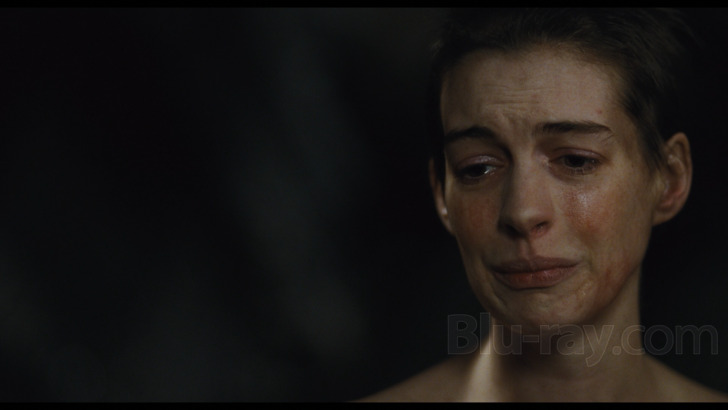
Note: Screenshots are sourced from the 1080 disc in this package.
Les Misérables is presented in 4K UHD courtesy of Universal Studios with an HEVC / H.265 encoded 2160p transfer in 1.85:1. There are some
noticeable differences
in this presentation when compared to the 1080 version, and rather interestingly one of them to my eyes is the much more modulated ebb and flow of
the grain field in this new version. Parts of the 1080 version looked fairly heterogeneous at times due to what I assume was pretty aggressive tweaking
in post, but while there are certainly spikes and valleys to grain in this new presentation, it struck me as being more consistently organic looking. You
can see clear differences in grain thickness in any number of moments, but simply compare the first mountainside moment with Jean after the opening
watery sequence for just the first of several marked jumps in grain visibility. I know a lot of people who felt the 1080 version was too dark and my
hunch is they may have that same complaint with this version, but I found HDR to at least marginally improve shadow detail, especially in the first third
or so of the film. That said, there are also noticeably more vivid pops of color even in this first section that are arguably more vivid than in the 1080
version. The middle section of the film actually looked a bit cooler to me in this version, with a somewhat blanched, desaturated palette, before things
warm up again for the climactic sequences. Throughout the film, the emphasis on blues and golds offers some subtle changes in hue in this version.
Detail levels are consistently impressive, at least when "arty" framings or manically moving cameras aren't
being employed.
Les Misérables 4K Blu-ray Movie, Audio Quality 
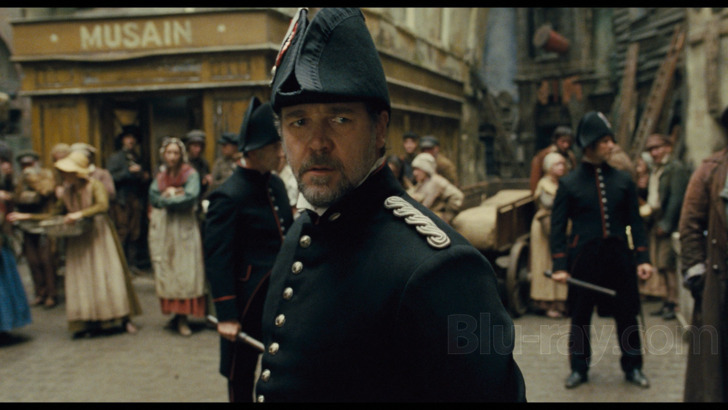
I gave top marks to the 1080 disc's DTS-HD Master Audio 7.1 track, and all of the positives I mentioned in my Les Misérables Blu-ray review are not only duplicated but both figuratively and literally topped by new immersive aspects added by this disc's Dolby Atmos audio. Almost from the get go, with the huge swoop down to Jean Valjean in his first of many maelstroms, the Atmos speakers resonate with activity, and one of the thrilling things about this mix is that while, yes, of course the score is omnipresent throughout all of the surround channels, there's a really beautifully layered mix adding in ambient environmental sounds at times that was to my ears more clearly and realistically presented in this Atmos version. As I mentioned on the 1080 release, the "live singing" element can lead to occasional lapses in comprehensiblity and frankly at least at isolated moments actual audibility, but this is a really spectacularly immersive track that I can't imagine fans of the musical not enjoying.
Les Misérables 4K Blu-ray Movie, Special Features and Extras 
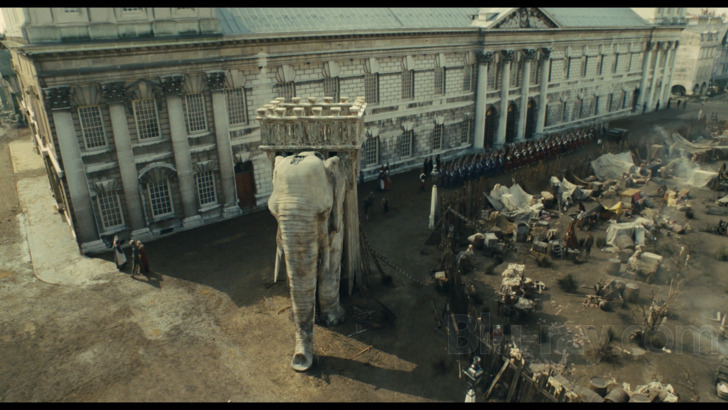
The 4K UHD disc ports over all of the supplements from the 1080 disc, with the sole exception of the kind of quaint BD Live functionality that was
offered on the 1080 release.
- Feature Commentary by Director Tom Hooper. Hooper provides an interesting, in depth commentary that covers a wealth of material. Some of the information is anecdotal, such as the change of placement of "I Dreamed a Dream" which allowed Anne Hathaway to tear into the number with a raw emotionalism, while other moments are filled with technical details, such as his decision to have the actors perform the vocals live, and how that was handled on set. Hooper fills the time rather well with very few down moments.
- Les Misérables: A Revolutionary Approach (HD; 1:03:54) is an excellent multi-part featurette that admittedly is nothing more than a slightly longer EPK than usual, but which contains some good interviews with the cast and crew and which has a glut of interesting behind the scenes footage (it's fascinating to watch that first water logged scene being prepped, to give just one example). There are segments devoted to the casting, production design, the barricade scene and fittingly a look at the original West End production. Original producer Cameron Mackintosh has a fun interview in costume.
- The Original Masterwork: Victor Hugo's Les Misérables (HD; 11:11) is a decent look at the source novel, again with Mackintosh (this time not in costume) and Tom Hooper, who may bring a laugh to some viewers' lips when he says Les Misérables is a perfect bedtime story to read to children. It's probably no coincidence that there's a close-up of a page in the novel with a section heading called "He Bears His Cross", since Hooper so obviously exploits Christ imagery in his depiction of Valjean.
Les Misérables 4K Blu-ray Movie, Overall Score and Recommendation 
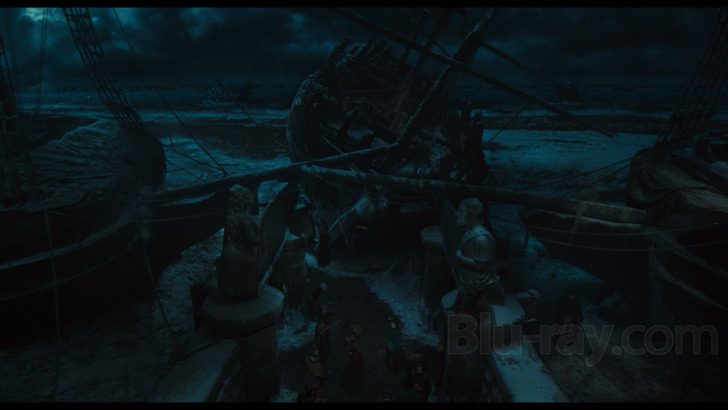
I know a lot of professional theater people, including several who did different national tours of Les Misérables (some in major roles), and their reaction has been about as disparate as the public at large. Some of these people absolutely love this film adaptation while others absolutely despise it. My personal reaction falls somewhere in the middle, with at least a tilt toward the favorable. I am not a fan of "shaky cam", especially in musicals, and Hooper's repeated use of fish eye lenses is just plain odd. The film also rather uneasily manages its quasi-operatic roots, and while its through sung approach is commendable, that doesn't necessarily mean it works as a film. On the other hand, the film has an epic sweep and an undeniable emotional heft that can't be denied. The performances are uniformly excellent and few will be able to ever forget Hathaway's commanding one take performance of "I Dreamed a Dream". Les Misérables may still work better on stage, but this film is a rather valiant attempt to reinvent the property for a different medium. Does it completely succeed? No, but like the rabble who join Jean Valjean in a struggle for justice, the mere fact that it tries is worthy of admiration. The 4K UHD presentation offers overall improvements in both video and perhaps especially audio, and comes Recommended.
Other editions
Les Misérables: Other Editions

Les Misérables
2012

Les Misérables
Limited Edition Gift Set
2012

Les Misérables
2012

Les Misérables
With Artbook & Bonus Disc
2012

Les Misérables
With Bonus Disc
2012

Les Misérables
Academy Award Series
2012

Les Misérables
2012
Similar titles
Similar titles you might also like

Les Misérables in Concert: The 25th Anniversary
2010

Love Never Dies
2012

The Phantom of the Opera
2004

The Phantom of the Opera at The Royal Albert Hall
25th Anniversary
2011

Moulin Rouge!
2001

The Greatest Showman
2017

Camille
Warner Archive Collection
1936

Phantom of the Opera 4K
1943

Les Misérables
1998

The Great Gatsby
2013

Fanny
1961

Beyond the Mask
2015

Gentlemen Prefer Blondes
1953

The Immigrant
2013

Me Before You
2016

Rent
2005

An American in Paris
1951

Fifty Shades of Grey
Unrated Edition
2015

Downton Abbey: The Motion Picture 4K
2019

Casablanca 4K
80th Anniversary Edition
1942